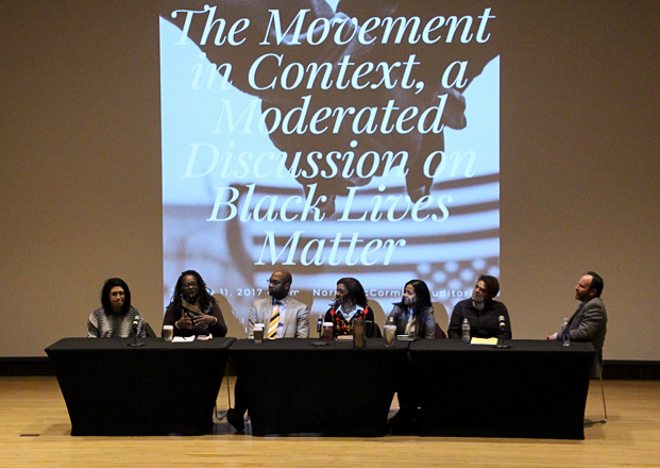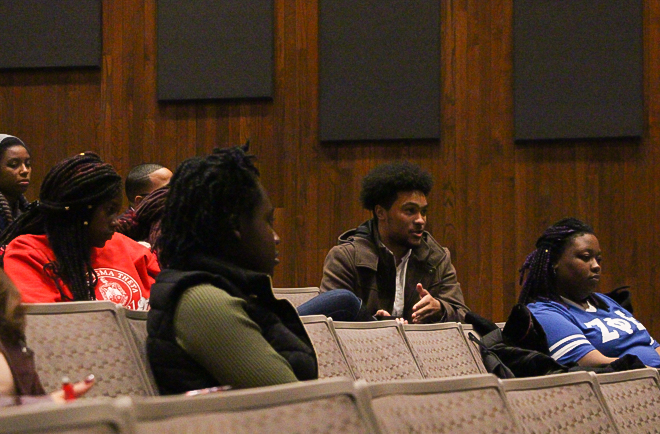
A panel of professors and faculty from Northwestern and Loyola University Chicago discuss the current state of the Black Lives Matter movement. The panel spoke about what part privilege and the history of civil rights movements play in the movement and what steps should be taken in the future.
Photo by Claire Bugos / North by Northwestern
A panel comprised of four Northwestern professors, NU’s Associate Provost for Diversity and Inclusion Jabbar Bennett and two Loyola University professors congregated in Norris’ McCormick Auditorium Wednesday night to participate in “The Movement in Context, a Moderated Discussion on Black Lives Matter.”
Held by the National Panhellenic Council and the National Association of Black Journalists, the programming was the latest installment in an ongoing series, “Black Lives Matter, A Northwestern Dialogue.”
The event opened with a moment of silence in honor of Jordan Hankins, a Weinberg sophomore who committed suicide on Monday. Hankins was a member of the Gamma Chi chapter of Alpha Kappa Alpha, one of NU’s historically African American sororities.
Moderator Danielle Harris of Delta Sigma Theta sorority opened the discussion by asking the panelists what came to mind when they heard the phrase “Black lives matter.”
Michelle Wright, a Northwestern professor in the African American studies and Comparative Literary departments, mentioned the controversy surrounding the chant, specifically the counter-slogan “all lives matter” and her response when faced with it: “all Black lives matter.”
“Too often, our discussion about Black lives focuses wholly on heterosexual Black men, which is absolutely important, but it also tends to erase the violence perpetrated against Black women, as well as Black trans women,” Wright said.
Northwestern professor of African American studies Debra Thompson went on to talk about the movement in relation to American democracy.
“At what point does it become not only undemocratic, but unethical, to ask the people who are the most exploited, the most vulnerable, and the most subjugated in society, to be the ones who have to continually sacrifice?” Thompson said. “At what point does our democracy demand too much of us? As James Baldwin asked, at what point is inclusion no longer worth the price of the ticket?”
The panelists answered prepared questions, such as the similarities and differences between Black Lives Matter and the Civil Rights Movement and the benefits and drawbacks of BLM being a grassroots effort. The discussion ended with questions from the audience.

Thompson spoke about the utility of the slogan as an umbrella to rally beneath, a sort of “cultural touchstone” and a way for smaller, local organizations to gain legitimacy.
“The idea that ‘Black lives matter’ can be used to frame the wealth of issues that ultimately encompass the system of white supremacy in which we exist,” Thompson said. “We can use ‘Black lives matter’ to challenge all these different strands of white supremacy and white privilege that systematically deny black and brown people’s access to privacy, profit, protection, and property. The malleability of the term is actually really, really powerful.”
One student mentioned the waves that were made when a BLM flag was raised outside of Norris at the beginning of the two-week dialogue, asking whether it was the responsibility of a university to facilitate discussion but ultimately remain neutral on controversial topics.
Thompson’s answer was simple: “The opposite stance of ‘Black lives matter’ is that black lives don’t matter. If the university wants to take that stance, then we all need to reconsider whether or not we want to be associated with that kind of message.”
Finally, the conversation turned to effective ways of gaining support for the cause from non-black individuals who may not have a stake in the fight. Wright suggested strategically finding and collaborating on shared goals, and Medill professor Deborah Douglas advised picking your battles by attempting dialogue only when “the person with whom you disagree is both moral and intelligent,” and then proceeding “with empathy and respect.”
“Students at over 90 different universities have protested under the banner of Black Lives Matter, and that’s amazing,” Thompson said. “While I question the university as an institution’s ability to be an agent of social transformation, I don’t question students’ abilities to be the agents of social transformation. If there is hope, it is with you.”